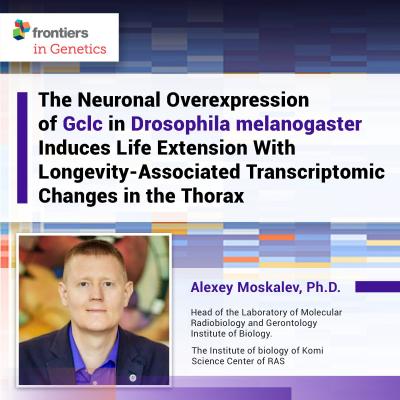Moskalev Lab published a new study on the influence of pro-longevity gene Gclc on age-associated transcriptomic changes in flies

Credit: Insilico Medicine
Monday, March 25 2019, – Alexey Moskalev, Ph.D., Head of the Laboratory of Molecular Radiobiology and Gerontology Institute of Biology, and co-authors from the Institute of biology of Komi Science Center of RAS, Engelgard’s Institute of molecular biology, involved in the study of the aging mechanisms and longevity of model animals announce the publication of a scientific article titled: “The Neuronal Overexpression of Gclc in Drosophila melanogaster Induces Life Extension With Longevity-Associated Transcriptomic Changes in the Thorax” in Frontiers in Genetics – a leading open science platform.
“The new study sheds light on longevity-associated transcriptome changes and will be useful for assessing the effects of genetic interventions that prevent premature aging,” said Alexey Moskalev, PhD, head of the laboratory of Geroprotector and radioprotector technologies.
Aging inevitably leads to progressive organ dysfunction, creating a major problem for modern medicine that seems to have required many parallel tissue-specific interventions slowing down aging of the whole organism. Sarcopenia is primarily a disease of the elderly, characterized by the loss of skeletal muscle function and mass. A number of studies showed that muscle tissue undergoes sufficient alterations in gene expression patterns, during aging in mammals and flies.
“Alexey Moskalev is one of the rising young stars in biogerontology and this study further advances our understanding of aging in flies. Aging is not only a fly problem but a process that concerns everyone on the planet regardless of race, sex or nationality. It is a global challenge that should be addressed through massive international collaborations and Dr. Moskalev is helping build a community of scientists working in longevity biotechnology”, said Alex Zhavoronkov, PhD, CEO of Insilico Medicine and adjunct professor at the Buck Institute for Research on Aging.
One of the major factors contributing to the decline of muscular function may be the decrease in antioxidant protection by glutathione. To prove this hypothesis, Alexey Moskalev, jointly with other scientists, investigated the effect of neuronal overexpression of the pro-longevity gene Gclc on age-related transcriptome changes in the thorax of Drosophila melanogaster. Previously, the authors showed that overexpression of this gene, encoding a cysteine ligase catalytic subunit, led to lifespan increase and decline of the spontaneous locomotor activity of flies. This study demonstrated 58 differentially expressed genes induced by Gclc overexpression involved in a variety of pathways of metabolism, such as Drug metabolism, Metabolism of xenobiotics by cytochrome P450, Carbohydrate metabolism. Also, changes in expression of genes related to the immune system, circadian rhythmicity, and downregulation of genes involved in proteolysis have been shown.
###
For further information, images or interviews, please contact:
Alexey Moskalev
[email protected]
About the Institute of biology of Komi Science Center of RAS
The Institute of Biology of Komi Scientific Centre of the Ural Branch of the Russian Academy of Sciences (IB Komi SC UB RAS) was founded in 1962. The Institute is the largest academic research centre of the East European part of Russia, with biology and ecology as two primary areas of research. The Institute consists of six departments and four laboratories, the Zoological museum, the Botanical garden and the Herbarium (SYKO). The main fields of research include the study of biodiversity, structural and functional organization, stability and productivity of taiga and tundra ecosystems, biological effects of ionizing radiation and other physico-chemical factors on cells, living organisms and natural ecosystems; problems of radiation and ecological genetics, as well as the development of methods for monitoring, bioindication; creation of inventories and databases of biological resources of the European North-East with the use of remote sensing and GIS technologies.
The official website: https:/
Please follow the link below to read the article: https:/
Media Contact
Alexey Moskalev
[email protected]
Related Journal Article
http://dx.




